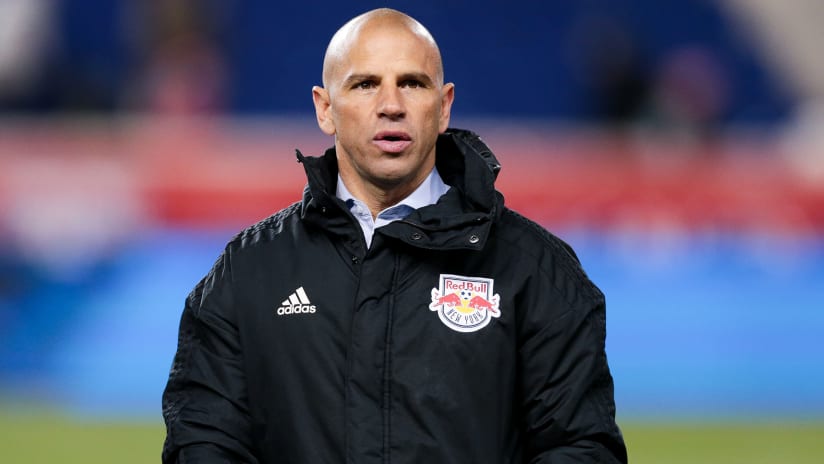Question: What’s the difference between a coach and a manager?
You might get confused if you based your answer on job titles around Major League Soccer and North American soccer in general, where the sideline boss, the person at the top of a club’s technical staff, is usually referred to as a “head coach” but is occasionally dubbed the “manager,” perhaps most notably with Peter Vermes at Sporting Kansas City.
The two jobs are not the same, however. And that’s a nuance that many are overlooking in their reactions to this week’s head-turning news that former New York Red Bulls and Toronto FC head coach Chris Armas is joining the staff of interim Manchester United manager Ralf Rangnick.
For some, it’s hard to resist making a wisecrack or two about this unexpected development, especially if you were among those unimpressed by Armas’ stints at RBNY and Toronto. While he hoisted the 2018 Supporters’ Shield at the former, the latter lasted only a matter of months, an awkward marriage between Armas’ pressing-centric ideas and the Reds’ older, possession-oriented roster that just didn’t come off.
Surely the likes of Cristiano Ronaldo and Paul Pogba won’t bend an ear for this Yank, right?! But that way of thinking misses out on the dynamics here.
Armas got the call from Manchester because of the strengths he’d already shown in abundance on the training ground for years, well before he got the opportunities to run the show in Toronto and Harrison.
A Chicago Fire FC icon and US international during his playing days, Armas climbed the coaching ranks the hard way, with no shortcuts, after his retirement in 2007. He coached youth soccer, even taught phys ed at St. Anthony's High School on Long Island, and his first head coaching gig of note was with the women’s team at Division II program Adelphi University, his alma mater.
By the time he joined the Red Bulls staff under Jesse Marsch in 2015, he’d honed the day-to-day craft of running training and fitness sessions, analyzing performance, working with players individually and in small groups – in short, the pivotal work of preparing and improving players and teams that largely unfolds out of the public’s view.
At some point not long after his arrival at RBNY he was introduced to Rangnick, a revered figure who was for years oversaw Red Bull’s global network at a director level and is widely considered the godfather, if you will, of the gegenpressing concepts that power so much of the Red Bull GmbH empire. Armas clearly made a positive impression because Rangnick has tabbed him to help implement his ideas at ManUtd.
While Armas has yet to prove he can perform as a manager – meaning the boss, the last word, the one who steers the ship and keeps more of a bird’s-eye view – at a high level, Armas has won widespread respect for his work as a coach. And that’s a fundamentally different job.
Here I’ll cite Real Salt Lake interim boss Pablo Mastroeni, who last week explained to me why he chose to work under Tab Ramos at Houston Dynamo FC and Freddy Juarez at RSL in order to better understand the profession after he moved straight from player to head coach with the Colorado Rapids in 2014.
“When I went to Houston, initially it was difficult for me,” said Mastroeni. “I went through from playing to coaching – managing, not really coaching, more managing than coaching. And I wanted to backfill my lack of experience with coaching. And I feel like as an assistant coach, you can pull players aside, work individually a little bit more, you can really focus on the different aspects of the tactics that the coach is asking, and break it down into smaller pieces and spend more quality time with players. And so that's what I wanted to do going to Houston and joining Tab’s staff.
“Tab has some great ideas; they were different than mine,” he added. “And so my adjustment going from head coaching to now an assistant was understanding that as an assistant coach, my job is to serve the head coach in any and every way he sees I can help. Where I wanted to help doing it my way, but that's not help, that's actually counterproductive.
“And so it was literally like a good month and a half of me on the job to come to this realization of my role here: I have nothing to do with this. [I’m] here to support the boss and make sure that I'm giving 100% in whatever endeavor he so chooses me to play, like, this is what he wants from me. And so it wasn't easy, but it was a very humbling and a very important role for my development as a coach.”
It’s easy to dream about being the manager, the decision-maker, the head honcho. After all, millions of soccer fans around the world play a video game called Football Manager, not Football Assistant, right?
But in many ways, the rest of the staff are the engine that makes the team go. Their contributions are crucial, and you can expect Armas to find a way to make the chronically-underachieving Red Devils better under Rangnick.














